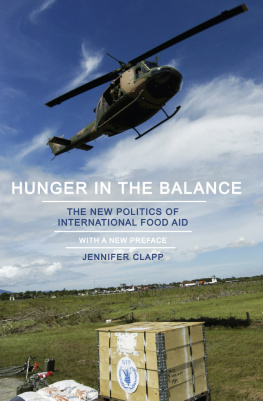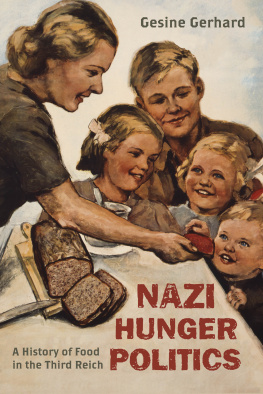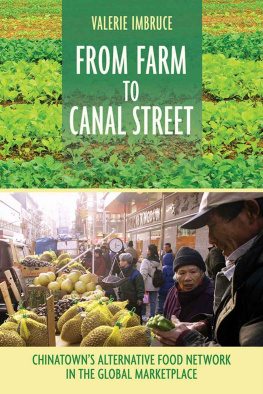FOOD POLITICS
WHAT EVERYONE NEEDS TO KNOW
FOOD POLITICS
WHAT EVERYONE NEEDS TO KNOW
ROBERT PAARLBERG


Oxford University Press, Inc., publishes works that further Oxford Universitys objective of excellence in research, scholarship, and education.
Oxford New York
Auckland Cape Town Dar es Salaam Hong Kong Karachi
Kuala Lumpur Madrid Melbourne Mexico City Nairobi
New Delhi Shanghai Taipei Toronto
With offices in
Argentina Austria Brazil Chile Czech Republic France Greece
Guatemala Hungary Italy Japan Poland Portugal Singapore
South Korea Switzerland Thailand Turkey Ukraine Vietnam
Copyright 2010 by Oxford University Press, Inc.
Published by Oxford University Press, Inc.
198 Madison Avenue, New York, New York 10016
www.oup.com
Oxford is a registered trademark of Oxford University Press.
All rights reserved. No part of this publication may be reproduced, stored in a retrieval system, or transmitted, in any form or by any means, electronic, mechanical, photocopying, recording, or otherwise, without the prior permission of Oxford University Press.
Library of Congress Cataloging-in-Publication Data
Paarlberg, Robert L.
Food politics: what everyone needs to know / Robert Paarlberg. p. cm.
Includes bibliographical references and index.
ISBN 978-0-19-538960-9; 978-0-19-538959-3 (pbk.)
1. Agriculture and state. 2. Food supply. 3. FoodMarketing. 4. Nutrition policy. I. Title.
HD1415.P12 2010
338.19dc22 2009038334
1 3 5 7 9 8 6 4 2
Printed in the United States of America on acid-free paper
CONTENTS
ACKNOWLEDGMENTS
This book was for me an interesting departure. It was not undertaken to solve a specific research problem, it was not supported by a funding agency, and there was no coauthor-ship or collaboration with a narrow circle of colleagues. In writing this book, I found myself drawing instead on multiple resources developed over my own lengthy career of research, consulting, and more than a dozen years of annual preparations for a course I teach on food politics. Many colleagues have helped me enormously along the way, probably with no idea it would ever lead to a book of this kind. Providing anything like a complete list of acknowledgments becomes out of the question.
I can, however, acknowledge several sources of constant help over all this time. Wellesley College has been my valued teaching home since 1976. This institution gives me generous research support whenever I need it and classroom access to some of the worlds smartest and most talented young women. The friend who made my career at Wellesley possible, Lawrence Sullivan, is someone I cannot thank too often or too much. The Weatherhead Center for International Affairs at Harvard University is a second institutional home for me, a place to collaborate with world-class scholars and international affairs practitioners from scores of different countries. Here it is appropriate for me to mention the personal association I have treasured most at Harvard, with Stanley Hoffmann, a humane scholar and teacher who never had any particular reason to help me out, but did so anyway over the years because that has always been his nature. My third institutional home has been the International Food Policy Research Institute (IFPRI) in Washington, D.C., where I have enjoyed a diverse mix of research and consulting opportunities. My most valued connection here is with Rajul Pandya-Lorch, a careful and tireless presence, who manages to keep IFPRIs door open to my work and who always seems to know whom I should be in touch with in Nairobi, Delhi, or Beijing.
I also owe a continuing debt to Michael Lipton, who has reserved surprising amounts of his valuable time at key moments for reading and reacting to what I have been writing and for tutoring me with his deeply informed understanding of rural poverty. Like so many others, I fail to measure up to Michaels high standards, but with gracious good cheer he helps me out anyway. Valued lessons in food and farming around the world have also come to me continuously through collaborations and coauthorships with Merilee Grindle, Robert Thompson, David Orden, Carl Pray, Ron Herring, and Calestous Juma. Particular gratitude in support of this new book must be extended to William Masters and Philip Paarlberg, who agreed on short notice to read the manuscript in draft and to provide reactions. I have learned to trust their judgment. It goes without saying, the mistakes that remain in this book are my own responsibility and nobody elses.
Special mention next goes to Lowell Hardin, an agricultural visionary and a humanitarian who provided essential support to my career in the early years when it mattered most. I learned later that Lowell has done this for countless others in the field and still does. Thanks, Lowell.
I also wish to thank my editor at Oxford University Press, Angela Chnapko, for originally suggesting this project and for guiding it to publication with a light but sure touch.
In the end, it is always family that matters most. This is particularly true in my case, as I was fortunate to be the son of one of the most respected agricultural policy experts of the second half of the 20th century, Don Paarlberg, from Purdue University. I dare not calculate how much less I would have done in my career without the constancy of his inspiration, example, and support. But wait, the Paarlberg family support system does not stop there! My fathers younger brother, Hoey Paarlberg, and my cousin Philip Paarlberg are also agricultural specialists. Hoey grew up with my dad on a farm in Lake County, Indiana, and later managed farms for Purdue University. My conversations with Hoey have always been a learning experience as well as a great pleasure. Cousin Phil, meantime, is a widely published professor of agricultural economics at Purdue and the brains of the family. I am always flattered when mistaken for him.
My late brother, Don Paarlberg Jr., also played an important role in setting my career path. It was a 1967 trip to visit Don, who was then a Peace Corps volunteer in Nepal, that triggered my interest in international development and introduced me to the dramatic challenges facing Asias rural poor. In addition, it was Don and his wife, Heeja, who introduced me and my own wife, Marianne, to the sensory pleasures of well-prepared Korean and Chinese food.
Marianne gets the last but strongest acknowledgment of all. During her own long career as the art director at a major university press, she taught me important lessons about how authors should and should not behave. And as a versatile chef, she also knows her way around food. Nutritious and well-prepared food was as important on her side of the family as successful farming was on mine. Together, we make a good combination.
PREFACE
When it comes to food, everybody is interested. Humorist Will Rogers opened his routine by saying, I never met a man I didnt like. In my own life, I have never met a person who did not like food, either growing it, preparing it, tasting it, or in many cases, arguing about it. We all have strong opinions about food, just as we do about politics. Food issues that become political are thus doubly divisive.
For this reason, I hesitated when asked by Oxford University Press to write a book describing what everyone needs to know about food politics. For each issue I would cover, a number of readers with views opposed to my own would be offended. Food politics can be a realm of irreconcilable difference. For each issue, there would also be specialists better informed than I, ready to notice even the smallest error. With each topic covered, then, I would be angering one group of readers while revealing my limitations to the other.
Next page





